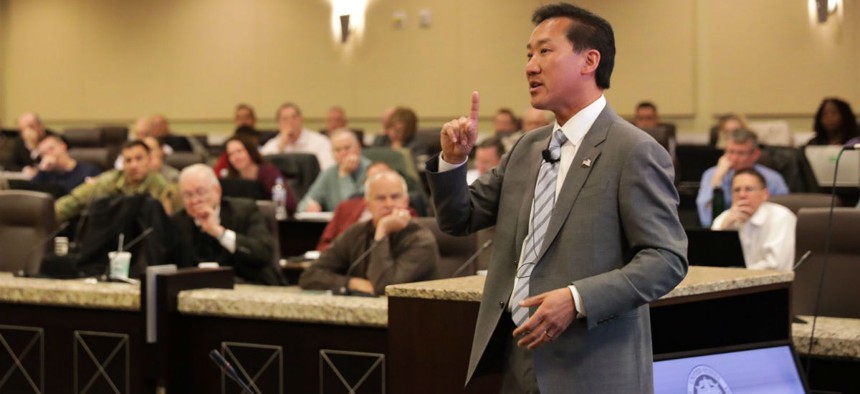
OPM Director Jeff Pon said he'll be more proactive than previous directors. OPM
OPM Director: Expect 'Full Court Press' for Civil Service Changes
In a call with reporters, Jeff Pon said he plans to ramp up use of his administrative authority in the coming months.
The head of the Office of Personnel Management said Monday that he plans to spend much of this year advocating on behalf of large-scale civil service reform, both through legislative proposals and administrative changes.
“Legislation is always the tougher lift, and we can do things through legislation, through executive orders and through agency-specific authorities and OPM-specific authorities, and I plan to push on all four,” OPM Director Jeff Pon said. “I know there are midterm elections and sometimes people get their attention elsewhere, but I’m making sure our staff at OPM have a full court press in the next six to seven months.”
During a conference call with reporters Monday morning, Pon laid out his vision for the future of the federal government’s human resources agency, stressing his desire to move HR practices to the digital space, as well as a plan to reassert long-dormant authorities available to his office.
“Although we have a lot of technology in the federal government, it’s not easy,” he said. “The expectation is very, very low for things to be mobile first or non-laptop based with PIV cards inserted . . . IT modernization is about making sure federal workers, citizens and job applicants can have an expectation of things working at a touch, versus calling, getting something on paper, or waiting three days for an ID or a password. Those are the things I’ve experienced coming back into government, and at best it’s unacceptable, and at worst, it’s also unacceptable.”
Pon echoed comments of OMB Deputy Director for Management Margaret Weichert, arguing that as the 40th anniversary of the signing of the 1978 Civil Service Reform Act approaches, it’s time to revisit federal hiring, performance management and compensation.
“Think about 40 years ago, how we were hiring and rewarding and doing all of those things,” Pon told reporters. “Things have changed. Technology has changed. Performance is not an individual sport anymore; it’s a team sport. Things are not jobs anymore, they’re projects. We have certain outdated things that we need to take a look at.”
Pon did not elaborate on what the administration’s civil service reform legislation might look like when introduced, but he said he would be much more proactive than previous OPM directors, who he said “nibbled around the edges” of civil service issues.
“I want to make sure OPM is responsive to the federal community, and we’re turning over a new leaf, making sure agencies have more flexibilities, and if I can’t do it at an agency level then I’ll do it at an occupational level,” he said. “That’s an authority of the director, it doesn’t need any legislation. I can implement a specialty pay with 90 days’ notice and two hearings and it would go into effect.”
The OPM director said he plans to work with federal employee unions on development of new personnel and compensation systems, and he bemoaned benchmarking employee pay using data systems based on “how we did things in the 1970s.” While federal employee groups typically point to data from the Bureau of Labor Statistics, which suggest feds are underpaid compared to their private sector counterparts, Republicans often cite Congressional Budget Office studies that suggest the opposite.
“I hope that I could provide unions with the data required for an intelligent conversation about the comparisons of different practices, different pay and different total reward systems, and then we could have a dialogue using the same data,” Pon said. “What happens in this town from time to time is that everybody chooses their own data and then makes an argument. I’d like to actually have all of the data there is that’s available, and if I’m missing something, we can try to include that too.”
Pon acknowledged that tackling civil service reform in Congress is a daunting task, particularly during an election year, but he said it’s a goal worth pursuing.
“Do I anticipate everything to work and go through? No,” he said. “I’ve already heard from some of my colleagues, ‘Maybe Pon is taking on too much, maybe he’s biting off too much.’ But I actually look at it a different way. I’m going to ask, and the worst they can say is, ‘No.’ But we will ask, and we will need to be brave about our leadership here at OPM.”







